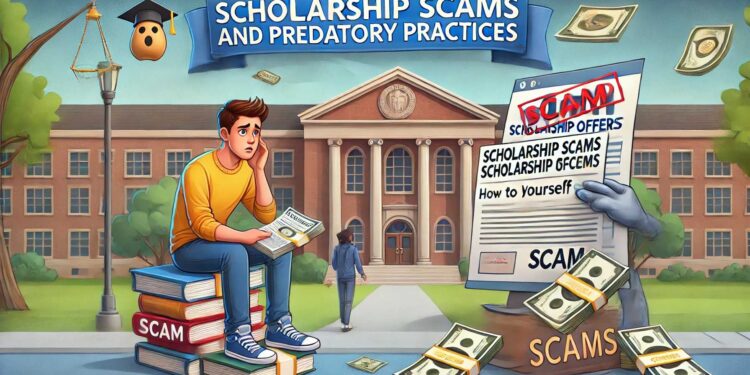In the quest for college funding, scholarships are a beacon of hope for many students and their families. However, this hope can sometimes be exploited by scam artists and predatory practices. Falling victim to these scams can cost you not just money, but also time and your personal information. Here’s a guide to recognizing and avoiding scholarship scams and predatory practices.
Common Types of Scholarship Scams
- Scholarship Application Fees
One of the most common scholarship scams involves charging an application fee. Legitimate scholarships do not require you to pay money to apply.
- Red Flag: If you are asked to pay a fee to apply for a scholarship, it’s likely a scam.
- What to Do: Avoid any scholarship that requires a payment to apply. Instead, seek out reputable scholarship databases that list free applications.
- Guaranteed Scholarships
Some scams promise that you are “guaranteed” to win a scholarship if you pay a fee.
- Red Flag: No legitimate scholarship can guarantee you will win.
- What to Do: Be wary of any service that promises guaranteed results. Scholarships are competitive by nature, and no one can guarantee you’ll receive one.
- Advance-Fee Loans
These scams offer low-interest student loans but require you to pay a fee upfront.
- Red Flag: Legitimate student loans do not require an upfront fee.
- What to Do: Never pay an advance fee for a loan. Research and use recognized student loan providers.
- Phishing Scams
Phishing scams involve fake emails or websites designed to steal your personal information, such as Social Security numbers, bank details, or login credentials.
- Red Flag: Emails or websites asking for sensitive information that seem suspicious or come from unknown sources.
- What to Do: Verify the legitimacy of the source by checking the URL, looking for reviews or complaints, and contacting the organization directly using a trusted method.
- Scholarship Seminars
Some organizations offer free seminars that turn into high-pressure sales pitches for paid services.
- Red Flag: Seminars that quickly shift focus to selling services or products.
- What to Do: If you attend a seminar, keep in mind that you should never feel pressured to buy anything. Take time to research any services offered before making a decision.
Predatory Practices
In addition to outright scams, there are predatory practices that may not be illegal but are still unethical and exploitative.
- Excessive Fees for Scholarship Searches
Some services charge high fees to search for scholarships that you could find for free.
- Red Flag: High costs for information that is readily available.
- What to Do: Use free resources and databases for scholarship searches, such as your school’s financial aid office, trusted websites, and public libraries.
- Misleading Marketing
Some companies use misleading marketing to make their services seem more effective or essential than they really are.
- Red Flag: Claims that seem too good to be true, such as a high success rate without proof.
- What to Do: Research the company, read reviews, and ask for evidence of their success rates.
Protecting Yourself: Tips and Strategies
- Do Your Research
Before applying for any scholarship, research the organization offering it. Check their reputation online, read reviews, and look for any complaints or red flags.
- Use Trusted Resources
Stick to well-known and reputable scholarship search engines, such as Fastweb, Scholarships.com, and Cappex. Also, consult your school’s financial aid office for recommendations.
- Never Pay to Apply
Legitimate scholarships do not require an application fee. If you are asked to pay, walk away.
- Guard Your Personal Information
Be cautious about sharing personal information. Legitimate scholarships may require some personal details, but be wary of any request for sensitive information like your Social Security number or bank account details.
- Consult Your School’s Financial Aid Office
Your school’s financial aid office can be an invaluable resource. They can help you verify the legitimacy of scholarships and provide guidance on finding genuine opportunities.
- Trust Your Instincts
If something feels off about a scholarship or the process, trust your instincts. It’s better to miss out on a potential opportunity than to fall victim to a scam.
What to Do If You’ve Been Scammed
If you suspect you’ve fallen victim to a scholarship scam, take immediate action:
- Contact Your Bank or Credit Card Company
If you’ve provided financial information, contact your bank or credit card company to stop payments and protect your accounts.
- Report the Scam
Report the scam to the Federal Trade Commission (FTC) at ftc.gov/complaint and to your state’s attorney general’s office. This can help prevent others from being scammed.
- Monitor Your Credit
Keep an eye on your credit report for any unusual activity. You can request a free credit report once a year from each of the three major credit bureaus through AnnualCreditReport.com.
- Educate Others
Share your experience with friends, family, and online communities to help others avoid falling into the same traps.
Conclusion: Stay Vigilant and Informed
Navigating the world of scholarships can be overwhelming, but staying vigilant and informed can help you avoid scams and predatory practices. Always do your research, use trusted resources, and trust your instincts. By taking these precautions, you can focus on finding legitimate scholarships that will help you achieve your educational goals without falling prey to fraudulent schemes. Remember, a little caution can go a long way in protecting yourself and your future.
















